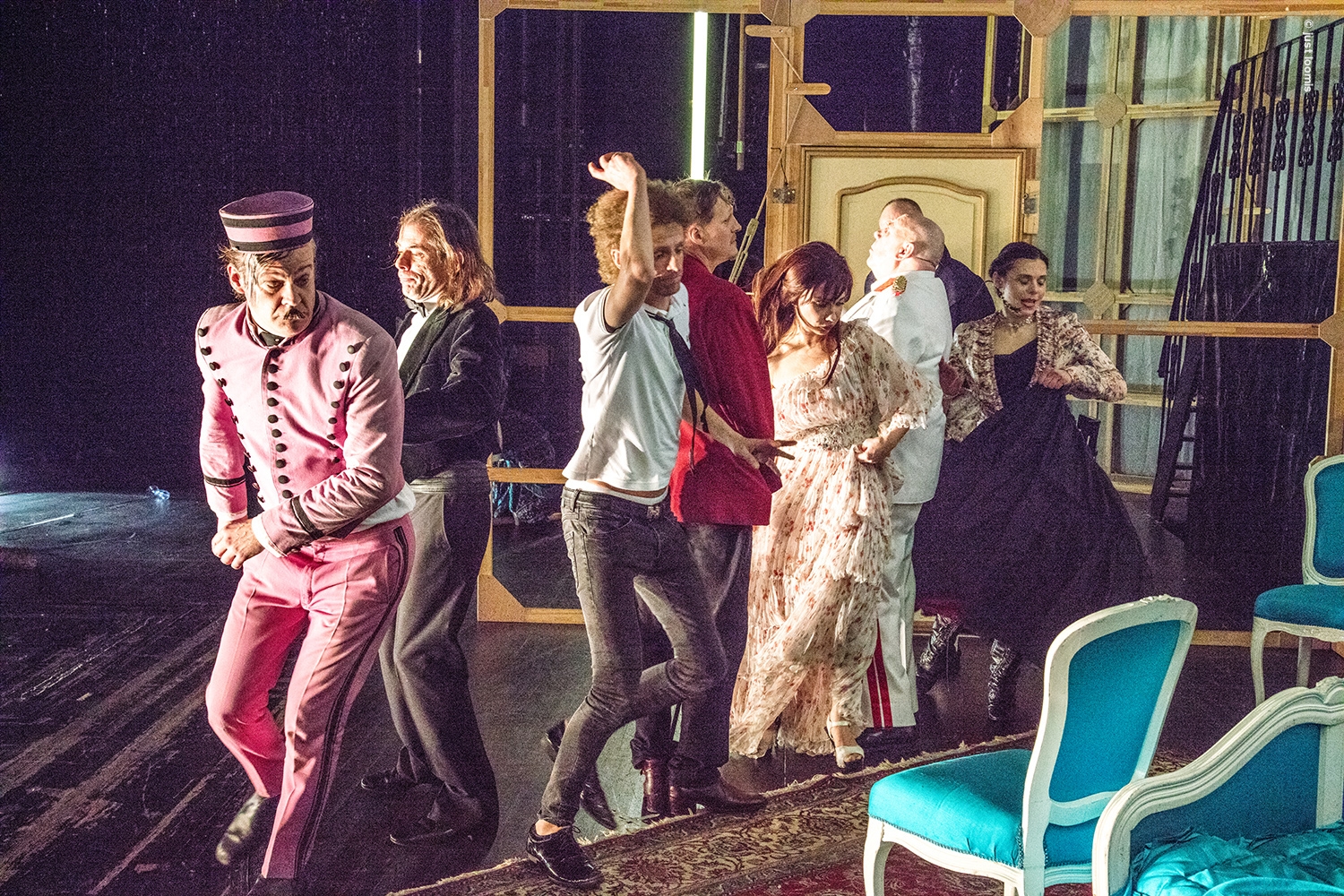


"It is in the interest of mankind that men like him should be exterminated“, thus is zoologist von Koren’s verdict on his fellow-countryman Laevsky, a melancholic civil servant from Saint Petersburg with a reluctance to work and a weakness for women, cognac and cards. The statement resounds with the doom and gloom of the 20th century – German delusions of grandeur and great power, the holocaust and stereotype thinking of totalitarian regimes.
Von Koren and Laevsky have just settled in a small town in the Great Caucasus. The one has come to investigate the embryology of jellyfish, the other wants to start a new life with his mistress Nadya, the adulteress. Chekhov’s characters often get together for fish soup and vodka, but they never engage in dialogue. Rather, they seem to be constantly talking past one another, lapsing into monologues of Beckettian absurdity. From the distant St. Petersburg, the Black Sea coast seemed like paradise – but once there, the steep rugged rocks and mountains resemble prison walls that crush all the colonizers’ plans for the future.
Laevsky and von Koren doubtlessly represent Imperial Russia, which had annexed the Caucasian territory in the 18th century. The representatives of the civilised metropolis come into contact with a diversity of cultures, they meet Circassians and Abkhaz, Orthodox Georgians and Armenians, as well as Muslim Chechens whose cultural and religious specificities are nevertheless completely ignored, repressed and eliminated. In an act of "asymmetric warfare", resistance develops against the cultural degradation. With Islamic spheres of influence reaching half-way around the globe by now, the West continues to confront this geopolitical power with both an attitude of innocence and the impulse to destroy, much like von Koren and Laevsky on the Caucasian battle field in the 1890s.
The dark humour, magical realism and inscrutability of Chekhov’s novella "The Duel" is exceptional, as is the text’s indeterminate oscillation between drama and prose. Amidst the lush coastal scenery of the Black Sea, Frank Castorf stages a post-nuclear scenario lacking any ideals, reminding of Andrei Tarkowsky’s film "Stalker" or Jan Schmidt’s early film "Late August at the Hotel Ozone". Under the circumstances, the dispersed group of people can only ensure their survival if they brutally fight for self-determination. Casting (almost) all the roles with a star-studded all-female ensemble of Volksbühne actresses, Castorf challenges the idea of both role models and role playing in various ways. The only male character, the garrison’s Doctor Alexander Davidych Samoylenko (and thus actor Hermann Beyer), is faced with an explosive conflict situation – and humanistic ideals get a rough ride yet again.
After the intertextual amalgamation of Chekhov’s play “Three Sisters" with the short story "Peasants" staged under the title "Nach Moskau! Nach Moskau!", "The Duel" is Frank Castorf’s second adaptation of a text by Anton Chekhov.
Premiere on 27th March 2013
Duration: 3h 45min, one break
With: Sophie Rois (Iwan Andrejewitsch Lajewski), Silvia Rieger (Nikolai Wassiljewitsch von Koren/ Marja Konstantinowna Bitjugowa), Lilith Stangenberg (Nadeshda Fjodorowna), Kathrin Angerer (Diakon Pobedow), Kathrin Wehlisch (Ilja Michailowitsch Kirilin), Bärbel Bolle (Der Tatare Kerbalai/ die Köchin Olga), Martha Fessehatzion (Atschmianow), Leonie Jenning (Katja Bitjugowa, ihre Tochter) and Hermann Beyer (Alexander Dawidowitsch Samoilenko)
Director: Frank Castorf
Stage Designer: Aleksandar Denic
Costumes: Adriana Braga, Teresa Tober
Light Design: Lothar Baumgarte
Video: Mathias Klütz, Harald Mellwig, Jens Crull, Konstantin Hapke, Christopher von Nathusius
Dramaturgy: Sebastian Kaiser
Massel Klezmorim – Der jiddische Fiddler
Cliff Martinez – On the Beach
Neil Young – After The Gold Rush
Graeme Revell – Sex Machine Attacks
Gonzales – Armellodie
Nele Karajlic – Daddy's Gone
Frank Zappa – Nanook Rubs It
Lustmord – Erie
Chris Garneau – The Leaving Song
Georg Danzer – Ruhe vor dem Sturm
Country Joe McDonald – Quiet Days In Clichy I+II
Kent Nagano – Varèse, Amériques
Frank London & Boban Markovic – Doin' The Oriental
Edith Piaf – Hymne à L'amour
Ennio Morricone – Paranoia Prima
Jimi Hendrix – ...And the gods made love
Cat Power – (I can't get no) Satisfaction
Woodkid – Iron
Mason Jennings – I am lonely
James Eric – Sexyback